Description

BuildTools

Quick Bid
Comprehensive Overview: BuildTools vs Quick Bid
BuildTools and Quick Bid are both software solutions tailored for the construction industry, but they serve different purposes and target markets. Here's a comprehensive overview of each:
a) Primary Functions and Target Markets
BuildTools:
-
Primary Functions: BuildTools is a cloud-based construction management software designed to streamline project management tasks. Its primary functions include project scheduling, budgeting, communication and document management, task management, and punch list tracking. It aims to provide a seamless platform for home builders and remodelers to manage the entire lifecycle of a construction project.
-
Target Markets: BuildTools primarily targets small to medium-sized custom home builders, remodelers, and general contractors who need an efficient system to manage their projects from start to finish. It is particularly useful for companies that focus on residential construction projects.
Quick Bid:
-
Primary Functions: Quick Bid is an estimating software specifically tailored for contractors in the construction industry. Its primary functions include creating detailed cost estimates and bids, performing takeoffs, managing material and labor costs, and generating reports. Quick Bid automates the estimating process, helping users to create accurate bids quickly.
-
Target Markets: Quick Bid is aimed at construction professionals such as general contractors, subcontractors, and specialty contractors who need a reliable system for cost estimating and bid management. It is widely used in both commercial and residential construction sectors.
b) Market Share and User Base
Comparing the overall market share and user base for BuildTools and Quick Bid can be challenging as these products serve different purposes and thus may not directly compete with each other. However:
-
BuildTools: Being a project management tool targeted especially at smaller builders and remodelers, BuildTools may have a niche but loyal user base. Its market share is likely smaller compared to large, comprehensive construction management suites that cater to all segments of the construction market.
-
Quick Bid: As an established player in the niche area of construction estimating, Quick Bid likely holds a larger market share in this specific domain. It is favored by many contractors due to its efficiency in producing accurate and fast estimates, and therefore could have a broader user base among larger contractors who frequently need to produce bids for various projects.
c) Key Differentiating Factors
BuildTools:
-
Integrated Project Management: BuildTools provides a complete project management solution encompassing communication, scheduling, and document management, which is essential for builders looking for an integrated approach.
-
Targeted at Home Builders: Its focus on residential construction makes it highly specialized for custom builders and remodelers, which differentiates it from more generalized construction management tools.
Quick Bid:
-
Specialized for Estimating: Quick Bid's primary strength is its specialized focus on cost estimation and bid management, which offers depth and accuracy that broader project management tools might not provide.
-
Efficiency in Bidding: The software is renowned for its efficiency and speed in producing bids, helping contractors to save time and increase their competitiveness in securing projects.
In summary, while BuildTools offers comprehensive project management and communication tools tailored for home builders, Quick Bid is specifically focused on providing accurate and efficient cost estimates and bids for contractors. They serve different yet sometimes overlapping needs within the construction industry, with each having distinct strengths in their respective areas.
Contact Info

Year founded :
1998
+61 2 9571 5540
Not Available
Australia
Not Available

Year founded :
Not Available
Not Available
Not Available
Not Available
Not Available
Feature Similarity Breakdown: BuildTools, Quick Bid
To compare BuildTools and Quick Bid, we should consider their core functionalities, user interfaces, and any unique features that distinguish them. Though the exact details might vary depending on the software versions and updates, here's a general breakdown:
a) Core Features in Common:
-
Project Management:
- Both platforms offer tools for managing construction projects, tracking progress, and coordinating tasks to ensure timely completion.
-
Estimating and Bidding:
- Both provide functionalities to create detailed cost estimates and facilitate the bidding process, which are critical in the pre-construction phase.
-
Document Management:
- They offer capabilities for storing, sharing, and managing project-related documents and files, ensuring everyone has access to the latest information.
-
Subcontractor Management:
- Both tools include features to manage subcontractor information, bids, and communications.
b) User Interface Comparisons:
BuildTools:
- Known for its user-friendly interface that integrates various project management aspects into a cohesive dashboard.
- Emphasizes simplicity with a clean layout, ensuring that all project components are easily accessible.
Quick Bid:
- Designed with a focus on the bidding and estimating process, offering a detailed and structured layout dedicated to these functions.
- The interface might appear more technical or specialized compared to BuildTools, with a focus on precise data entry and report generation.
c) Unique Features:
BuildTools:
- Communication Tools:
- BuildTools excels in providing robust communication features such as messaging platforms and logs, which are integral for real-time communication and collaboration.
- Change Order Management:
- Includes comprehensive tools for tracking and approving change orders, ensuring that any modifications to the project scope are documented and approved.
Quick Bid:
- Advanced Estimating Features:
- Quick Bid is particularly strong in offering advanced estimating tools, like detailed assemblies and cost databases, that cater to complex bidding requirements.
- Integration with Takeoff Software:
- Often integrates seamlessly with takeoff software, allowing users to quickly move from plan takeoff to bid generation.
Each tool has strengths that can benefit different aspects of construction project management or estimating, so the choice might depend on the specific needs of the user or organization, such as whether the emphasis is on comprehensive project management versus specialized bidding and estimating processes.
Features

Project Management
Resource Management
Collaboration Tools
Client Management
Budget Tracking
Reporting & Analytics
Team Collaboration
Financial Management

Cost Estimation
Project Management
Client Communication
Reporting
Bid Management
Best Fit Use Cases: BuildTools, Quick Bid
BuildTools and Quick Bid are both tools widely used in the construction industry, but they cater to distinct needs and business scenarios. Here's how each one fits into different use cases:
a) Best Fit Use Cases for BuildTools
Types of Businesses or Projects:
-
Residential Construction:
- BuildTools is ideal for custom home builders and residential remodelers who need a robust project management platform that handles various aspects of home construction projects, including scheduling, budgeting, and communications.
-
Small to Mid-Sized Construction Firms:
- These companies often benefit from BuildTools because it offers a comprehensive suite of features without the complexity or cost associated with larger enterprise solutions.
-
Project Management Focused:
- Firms that prioritize seamless project management, including document control, client communication, and collaboration, will find BuildTools particularly useful.
Scenario Highlights:
- Client Communication: Projects requiring constant updates and transparent communication with clients can leverage BuildTools’ client portals and communication tools.
- Budget Tracking: Projects with tight budgets benefit from BuildTools’ budgeting and financial tracking capabilities to maintain control over expenses.
b) Preferred Scenarios for Quick Bid
Types of Businesses or Projects:
-
Commercial Contractors and Estimators:
- Quick Bid is designed for commercial contractors who need accurate and efficient bidding tools to calculate costs and manage bid proposals.
-
Estimator-Focused Operations:
- Firms that focus heavily on the estimating process will find Quick Bid’s automation and precise calculation tools invaluable for generating competitive bids.
Scenario Highlights:
- High-Volume Bidding: Companies involved in frequent and high-volume bid requests benefit from Quick Bid’s ability to streamline and automate estimating tasks.
- Cost Control: Projects that require detailed cost management can utilize Quick Bid’s features for materials, labor, and equipment estimates, ensuring comprehensive bid proposals.
d) Catering to Different Industry Verticals or Company Sizes
Industry Verticals:
-
Residential vs. Commercial:
- BuildTools excels in the residential sector with features tailored for custom home building and remodeling, while Quick Bid is more suited for commercial construction projects where precise cost estimation is critical.
-
Remodeling and Specialized Builds:
- BuildTools caters well to these niches by offering flexible project management solutions that adapt to various residential project requirements.
Company Sizes:
-
Small to Mid-Sized Businesses:
- BuildTools, with its user-friendly interface and integration capabilities, is accessible for smaller companies that need an all-in-one project management tool.
-
Larger Contractors and Specialists:
- Quick Bid serves larger contractors that may have specialized departments or teams focused on bidding and estimating, providing them with tools to enhance efficiency and accuracy in competitive bid creation.
Both BuildTools and Quick Bid serve complementary roles within the construction industry, allowing firms to choose tools that fit their particular operational needs and project focuses.
Pricing

Pricing Not Available

Pricing Not Available
Metrics History
Metrics History
Comparing undefined across companies
Conclusion & Final Verdict: BuildTools vs Quick Bid
Conclusion and Final Verdict
When evaluating BuildTools and Quick Bid, it’s essential to consider your specific needs and how each tool aligns with your project management and estimating requirements. Both offer valuable functionalities but cater to slightly different aspects of construction management.
a) Best Overall Value
BuildTools provides the best overall value for construction companies looking for a comprehensive project management solution. It integrates project scheduling, document management, budgeting, and communication tools into a single platform, making it ideal for those wanting a well-rounded tool from the start to completion of projects.
b) Pros and Cons
BuildTools:
-
Pros:
- Comprehensive project management capabilities.
- Includes communication, scheduling, and budgeting tools.
- Cloud-based platform, allowing for easy access from anywhere.
- Improves collaboration across teams.
-
Cons:
- May be more expensive for small businesses or those who only need basic estimation features.
- Some users may find the initial setup and learning curve challenging.
Quick Bid:
-
Pros:
- Specialized estimating software designed to accelerate the bidding process.
- User-friendly interface specifically tailored for creating precise bids.
- Excellent reporting features that help in presenting estimates quickly.
- Suitable for contractors who focus heavily on bidding and estimation.
-
Cons:
- Limited project management features compared to BuildTools.
- Less suitable for those who need a full suite of management tools beyond estimation.
- May require integration with other software for complete project management functionalities.
c) Recommendations for Users
-
Assess Needs: Determine the primary needs of your business. If you require an end-to-end project management solution, BuildTools might be the better choice. Conversely, if your priority is streamlining the bidding process with accurate estimates, Quick Bid is highly suitable.
-
Budget Considerations: Consider the pricing structure of each platform. For smaller businesses, Quick Bid might be a cost-effective option if extended project management features are unnecessary.
-
Integration Requirements: If your company already uses other management tools, consider how well each product integrates with existing systems. Quick Bid users might need additional software for project management, while BuildTools users may enjoy an all-in-one solution.
-
Trial Usage: Most software provides trial periods. Experiment with both platforms to understand their functionalities better and see which aligns more with your workflows.
Ultimately, both products have their strengths, and the best choice depends largely on your specific operational needs and existing infrastructure.
Add to compare
Add similar companies



